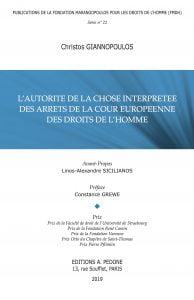
CYPRIOT CASES BEFORE THE ECtHR: A PRACTICAL GUIDE
Project on Foster transparency of judicial decisions and enhancing the national implementation of the ECHR
Author(s): Giannopoulos, Christos
What about a constitutional principle concerning the institutional organisation of the State, such as the separation of powers, in the jurisprudence of an international court of human rights, such as the European Court of Human Rights? Although it would be daring to prove that the Strasbourg judge applies a certain theory of separation of powers, it is nonetheless relevant to answer the question of whether the solutions adopted by the European human rights judge outline a coherent vision of what, according to him, the relations between the powers should be.
Furthermore, one shall not ignore the fact that the theory of the separation of powers as it is conceived in the contemporary liberal State only implies the consecration of a minimal base of solutions being acquired. It thus appears that the primordial aspiration of the separation of powers lies in the protection of the judicial and legislative powers against the executive power. The European human rights judge shares this perspective. If the principle of separation of powers is not a principle stated by the Court, at least with the necessary precision, it is a principle already present in the Strasbourg body of case law whose future is promising.
